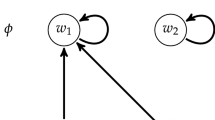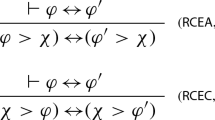Abstract
Our understanding of subjunctive conditionals has been greatly enhanced through the use of possible world semantics and, more precisely, by the idea that they involve variably strict quantification over possible worlds. I propose to extend this treatment to ceteris paribus conditionals – that is, conditionals that incorporate a ceteris paribus or ‘other things being equal’ clause. Although such conditionals are commonly invoked in scientific theorising, they traditionally arouse suspicion and apprehensiveness amongst philosophers. By treating ceteris paribus conditionals as a species of variably strict conditional I hope to shed new light upon their content and their logic.
Similar content being viewed by others
References
Arthur, W. and Fenster, S.: 1969, Mechanics, Holt, Rinehart and Winston, New York.
Boutilier, C.: 1994, Conditional logics of normality: A modal approach, Artificial Intelligence 68, 87–154.
Boutilier, C. and Becher, V.: 1995, Abduction as belief revision, Artificial Intelligence 77, 43–94.
Bowie, G.: 1979, The similarity approach to counterfactuals: Some problems, Noûs 13, 477–498.
Cartwright, N.: 1983, How the Laws of Physics Lie, Clarendon, Oxford.
Cartwright, N.: 1999, The Dappled World, Cambridge University Press, Cambridge.
Delgrande, J.: 1987, A first order logic for prototypical properties, Artificial Intelligence 33, 105–130.
Earman, J. and Roberts, J.: 1999, “Ceteris paribus” there is no problem of provisos, Synthese 118, 439–478.
Earman, J., Roberts, J. and Smith, S.: 2002, Ceteris paribus lost, Erkenntnis 57, 281–301.
Gundersen, L.: 2004, Outline of a new semantics for counterfactuals, Pacific Philosophical Quarterly 85, 1–20.
Halpern, J. and Rabin, M.: 1987, A logic to reason about likelihood, Artificial Intelligence 32, 379–405.
Hansson, B.: 1969, An analysis of some deontic logics, Noûs 3, 373–398.
Hempel, C.: 1988, Provisos: A problem concerning the inferential function of scientific theories, Erkenntnis 28, 147–164.
Krabbe, E.: 1978, Note on a completeness theorem in the theory of counterfactuals, Journal of Philosophical Logic 7, 91–93.
Kripke, S.: 1980, Naming and Necessity, Basil Blackwell, Oxford.
Laymon, R.: 1985, Idealization and the testing of theories by experimentation, in P. Achinstein and O. Hannaway (eds.), Observation, Experiment and Hypothesis in Modern Physical Science, MIT, Cambridge, Massachusetts.
Laymon, R.: 1989, Cartwright and the lying laws of physics, Journal of Philosophy 86, 353–372.
Lemmon, E.: 1977, An Introduction to Modal Logic, Blackwell, Oxford.
Lewis, D.: 1971, Completeness and decidability of three logics of counterfactual conditionals, Theoria 37, 74–85.
Lewis, D.: 1973a, Counterfactuals and comparative possibility, Journal of Philosophical Logic 2, 418–444.
Lewis, D.: 1973b, Counterfactuals, Blackwell, Oxford.
Lewis, D.: 1974, Semantic analyses for dyadic deontic logic, in S. Stenlund (ed.), Logical Theory and Semantical Analysis, Reidel, Dordrecht.
Lewis, D.: 1979, Counterfactual dependence and time’s arrow, Noûs 13, 455–476.
Makinson, D.: 1966, On some completeness theorems in modal logic, Zeitschrift für mathematische Logik und Grundlagen der Mathematik 12, 379–384.
McCarthy, J.: 1986, Application of circumscription to formalizing common sense knowledge, Artificial Intelligence 28, 89–116.
Menzies, P.: 2004, Difference making in context, in J. Collins (ed.), Causation and Counterfactuals, MIT, Cambridge, Massachusetts.
Millikan, R.: 1984, Language, Thought and Other Biological Categories, MIT, Cambridge, Massachusetts.
Nozick, R.: 1981, Philosophical Explanations, Harvard University Press, Cambridge, Massachusetts.
Pietroski, P. and Rey, G.: 1995, When other things aren’t equal: Saving “ceteris paribus” laws from vacuity, British Journal for the Philosophy of Science 46, 81–110.
Shaffer, M.: 2001, Bayesian confirmation theories that incorporate idealizations, Philosophy of Science 68, 36–52.
Shiffer, S.: 1987, Remnants of Meaning, MIT, Cambridge, Massachusetts.
Shiffer, S.: 1991, Ceteris paribus laws, Mind 100, 1–18.
Sober, E.: 1984, The Nature of Selection, MIT, Cambridge, Massachusetts.
Van Fraassen, B.: 1972, The logic of conditional obligation, Journal of Philosophical Logic 1, 417–438.
Author information
Authors and Affiliations
Corresponding author
Rights and permissions
About this article
Cite this article
Smith, M. Ceteris Paribus Conditionals and Comparative Normalcy. J Philos Logic 36, 97–121 (2007). https://doi.org/10.1007/s10992-006-9030-2
Received:
Published:
Issue Date:
DOI: https://doi.org/10.1007/s10992-006-9030-2




